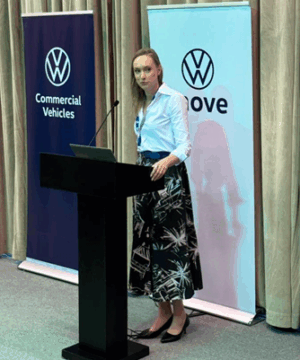By Ernest Bako WUBONTO, Kigali – Rwanda
The Volkswagen Group Africa (VWGA) and the African Association of Automotive Manufacturers (AAAM) have together highlighted the crucial role that the ‘Rules of Origin’ (RoO) component of the African Continental Free Trade Area (AfCFTA) plays in fostering development within Africa’s car manufacturing sector.
As per stakeholders, with an adequate policy framework established, AfCFTA — which creates a single market for 1.3 billion individuals and has a total GDP of roughly $3.4 trillion — might allow Africa to produce anywhere from 3.5 million to five million vehicles each year.
The AfCFTA Auto Pact (AAP) seeks to establish a unified continental framework, guaranteeing that individual country policies are coordinated to foster regional manufacturing, boost intra-African commerce, and improve competitive capabilities within the automotive industry.
At present, the AfCFTA Secretariat is wrapping up a Rules of Origin (RoO) policy specifically tailored for the automotive industry. This new policy aims to require at least 40% locally sourced materials in all vehicles produced within Africa—a primary goal strongly supported by the AAAM.
Stakeholders in the industry predict that the Rules of Origin (RoO) policy will not just foster trade-linked investments and enhance economic integration, but also increase the demand for new vehicles sustainably. Furthermore, it is anticipated to facilitate a steady reduction in the influx of second-hand vehicle imports from industrialized nations.
Upon full implementation, the Rules of Origin (RoO) policy is expected to boost human capital growth and strengthen local capabilities, increase accessibility to cost-effective skilled labor, and create a robust intra-African logistics supply chain.
Unified standards and investment
Martina Biene, Chairperson and Managing Director of VWGA, emphasized the significance of a unified policy strategy, highlighting that the substantial market prospects offered by AfCFTA present a major chance for the automotive sector to flourish across the continent.
“AfCFTA offers a chance for African nations to align their rules and standards concerning vehicle manufacturing and safety. By lowering trade obstacles, producers can effortlessly obtain components and parts from various African countries,” she explained.
Biene also emphasized that incorporating Trade-Related Investment Measures (TRIMs) into the AfCFTA Policy Pact is essential for boosting the demand for new vehicles.
Expanding production via regional collaboration
Victoria Backhaus-Jerling, CEO of AAAM, emphasized that effectively implementing the AfCFTA Rules of Origin will boost production capabilities, thanks to the policy’s focus on regional cooperation and interconnected supply chains.
“The automotive sector constitutes a worldwide production and trading network dominated by Original Equipment Manufacturers (OEMs), necessitating large-scale manufacturing to stay competitive. The AfCFTA provides this necessary scale—if it is backed by appropriate strategies, policies, and ecosystem development,” she stated.
She stated that the RoO will help standardize regulations for both new and used vehicles, as well as for spare parts and fuel quality specifications, across different markets.
“Expanding the new vehicle market in Africa necessitates harmonious but autonomous national policies, the creation of interconnected supply chains, and a Pan-African Automotive Agreement that encourages cooperation among different regions within the AfCFTA structure,” she noted.
Challenges preceding the RoO deadline
The target date of October 2025 has been established for the Rules of Origin (RoO) policy under the Africa Continental Free Trade Area (AfCFTA). So far, out of the 46 AU member states that were supposed to submit their preliminary tariff proposals to the AfCFTA Secretariat, all have done so. Nevertheless, merely 38 nations have met the criteria for tariff liberalization verification, which could pose challenges in achieving full compliance by the specified deadline.
Stakeholders in the industry have expressed worry that postponements in completing and implementing the policy will further exacerbate the difficulties confronting Africa’s beleaguered car manufacturing sector.
Transition to electric vehicles and new developments in mobility patterns
Backhaus-Jerling highlighted that the AAP will back the shift across Europe from conventional Internal Combustion Engine (ICE) cars to Electric Vehicles (EVs), along with other alternative propulsion systems.
“The shift requires transforming manufacturing processes and supply chains as internal combustion engine components are substituted with electric vehicle-specific parts. The acceptance of EVs will largely rely on the establishment of reliable charging infrastructure, which demands substantial investment in both energy and logistics systems,” she explained.
Nevertheless, she warned that the pace and character of this transition will differ from one country to another, influenced by varying degrees of investment and differing policy orientations.
Moreover, she encouraged policymakers to incorporate measures addressing the expanding micromobility sector – including e-scooters, bikes, and various lightweight electric conveyances – as this area is becoming increasingly popular because of urbanization, escalating car purchase expenses, and an increased preference for eco-friendly transportation alternatives.
As she pointed out, technology and the rate of change can vary significantly between different types of transportation sectors.
In-country procurement and enhanced value generation
Biene revealed that 50 to 60 percent of certain Volkswagen Group Asia-produced cars already comply with the local content criteria outlined in the suggested Rules of Origin (RoO) policy.
She highlighted opportunities like Zambia’s copper deposits, which have the potential to be utilized domestically for manufacturing copper wires instead. At present, unprocessed copper is sent from Africa to Europe for refinement and then shipped back again—a process she believes ought to be substituted with intra-continental value enhancement to bolster the auto parts industry.
Provided by Syndigate Media Inc. (
Syndigate.info
).


Leave a Reply